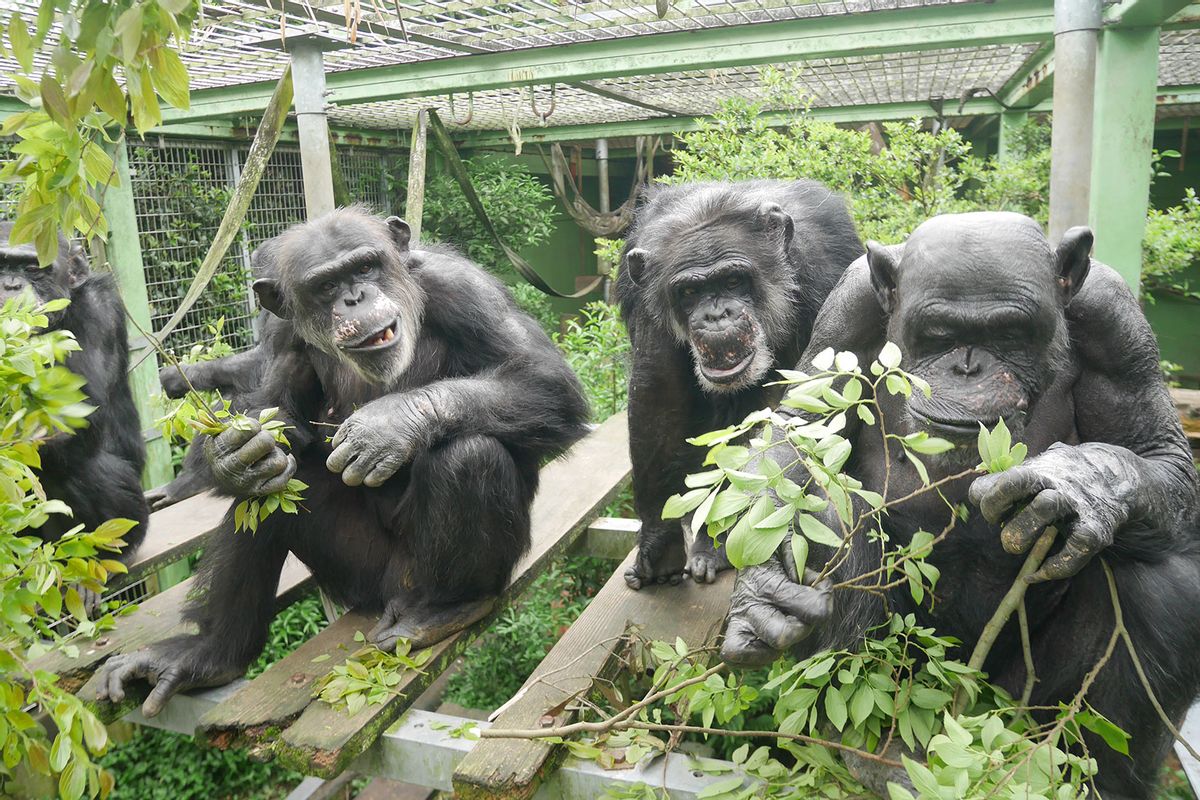“Monkey see, monkey do” isn’t just a playground aphorism, it’s a pretty apt way of describing the behavior of us primates. Some of our contagious behaviors are involuntary; for example, if someone yawns in our vicinity, we might find ourselves also trying to suppress a yawn. Other primates, including chimpanzees (Pan troglodytes), experience similar phenomena such as contagious yawning, scratching, grooming and playing. Now there is research which reveals chimps even pee contagiously.
"Urination, a seemingly simple physiological act, can also spread socially within a group."
A recent study in the journal Current Biology led by scientists at Kyoto University's Wildlife Research Center found that if one individual chimp starts to urinate, others that see it will feel compelled to do so. While this may seem odd to humans, who are far more inclined to seek privacy rather than intimacy when urinating, the chimps’ behavior in fact directly relates to our own. This behavior may help with territorial markings, but also group bonding or even preparing to travel — essentially the ape version of going pee before heading on a road trip.
“Humans and non-human animals share many social phenomena linked to group living — we’re all influenced by the presence of others, even in everyday activities,” lead author Ena Onishi, a Kyoto University primate researcher, told Salon. “For instance, behaviors like yawning, walking, rhythmic tapping, and even changes in pupil size are contagious in both humans and chimpanzees. Our study fits into this framework by showing that urination, a seemingly simple physiological act, can also spread socially within a group.”
To learn this, the scientists recorded 20 captive chimpanzees over a period of more than 600 hours. They compared the animals’ synchronization rate (proportion of urinations within 60 seconds of another) to 1,000 sessions of randomized computer simulations of urination, finding that the former showed more evidence of urination acts deliberately coinciding rather than occurring arbitrarily. Then they studied whether urinators and potential followers were more likely to pee simultaneously when standing closer to each other, which proved to be the case. Finally, they examined whether individuals higher in the chimpanzees’ social hierarchies were more influential in inspiring urination acts than low-status individuals, and found that that did indeed happen often.
“These results support the notion of socially contagious urination,” the authors conclude. Co-author Shinya Yamamoto, an associate professor of primatology at Kyoto University, told Salon that this finding is significant because it is the first to ever study contagious urination in any animal, including humans. Now that they have found all of this new data, more questions have been raised.
“We need to investigate this further from a broader comparative perspective,” Yamamoto said. “Apes have a wide variety of social structures and dynamics.” As one example, chimpanzees and bonobos do not have strict hierarchies based on individuals being male or female, as seen among other primate species. Similarly “chimpanzee society is more competitive in nature, but may be better at group cooperation, such as cooperative hunting and border patrolling, than bonobos that have a more peaceful society characterised by high inter-individual tolerance. Gorillas form a family-like society, typically with a single adult male and several females and offspring, whereas orangutans are basically solitary.”
Want more health and science stories in your inbox? Subscribe to Salon's weekly newsletter Lab Notes.
“Exploring this connection... offers valuable insights into how social animals have evolved systems to maintain group cohesion.”
All of these differences, Yamamoto explained, could determine how contagiously each species of primate urinates. Right now, the researchers aren’t entirely sure why this happens, proposing that “experimental work targeting the potential sensory cues and social triggers will be necessary to examine underlying mechanisms.”
When most people encounter each other in a public bathroom, the last thing they want to do is pay attention to another person’s business. Humans treat our waste excretion as an intensely private experience. Animals, not so much.
“Exploring this connection between physiological responses and social living offers valuable insights into how social animals have evolved systems to maintain group cohesion,” Onishi said.
Studying chimpanzees has taught us a huge amount about our own evolution. A 2023 study in the journal Nature Communications revealed that chimpanzees have specific sounds associated with warning their peers about the presence of snakes. They did this by pranking the chimpanzees with fake snakes, then recording their responses.
"We propose the 'alarm-huu + waa-bark' represents a compositional syntactic-like structure, where the meaning of the call combination is derived from the meaning of its parts," the authors explained in their study. University of Zurich professor Simon Townsend, a study co-author, told Salon at the time that “humans and chimpanzees last shared a common ancestor approximately 6 million years ago. Our data therefore indicate that the capacity to combine meaningful vocalizations is potentially at least 6 million years old, if not older."
Similarly, a 2022 study in the journal Communications Biology learned that a group of 46 chimpanzees at Taï National Park in the African country of Côte d'Ivoire can produce 390 distinct vocalizations. Catherine Crockford of Germany's Max Planck Institute for Evolutionary Anthropology, who co-authored the paper, told Salon by email at the time, "What is astonishing in the chimpanzee vocal repertoire, compared to other non-human animals, is the extreme flexibility in which they can combine their limited number of signals.”
While urinating may seem wildly different than speaking, both acts can form bonds between individuals and thereby strengthen social cohesion. Indeed, that was Onishi’s ultimate conclusion about the relevance of their research.
“When one chimpanzee urinates, others nearby are more likely to urinate within a short time frame,” Onishi said. “It’s not like they intentionally gather to urinate together — since they urinate wherever they are. Perhaps it might be easy to imagine contagious yawning.”



Shares